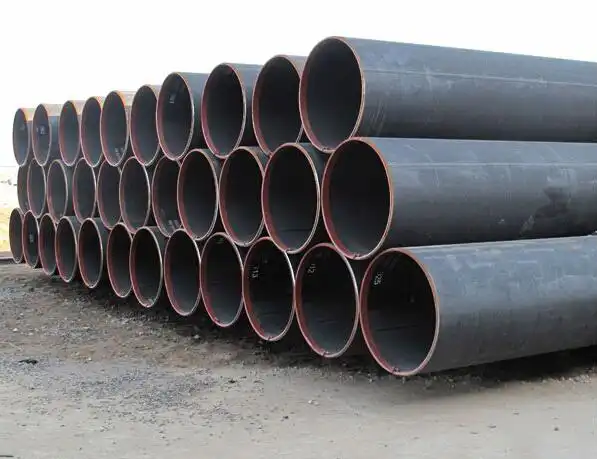What is the yield strength of A671 CC60?

Minimum Yield Strength Value of A671 CC60 Pipeline
The yield strength is a crucial factor in determining a material's capacity to withstand stress without permanent deformation in the context of steel pipelines. One such critical grade, indicated inside the ASTM A671 Pipe standard, is A671 CC60. This grade is designed specifically for electric-fusion-welded steel pipes intended for lower-temperature environments. The 'CC' in its assignment implies 'Creep Strength Improved', featuring its upgraded opposition against steady misshapening under consistent pressure, a basic trademark in pipeline life span.
A671 CC60 is meticulously engineered to strike a delicate balance between robustness and malleability, with "60" denoting the minimum yield strength in ksi (thousand pounds per square inch). This equilibrium is basic in guaranteeing the dependability and security of pipelines across a range of utilizations, where the stakes frequently include shipping fundamental substances overstretched separates and testing territories.
When it comes to safeguarding against structural compromise and potential dangers associated with pipeline operations, the material's capacity to resist yielding under pressure is of the utmost importance. By sticking to rigid ASTM principles, the CC60 epitomizes strength as well as malleability, empowering it to endure shifting ecological circumstances and functional burdens really.
Yield Strength Variation
The yield strength of the CC60 pipes is a basic boundary impacted by elements, for example, pipe size and wall thickness. In bigger width lines or those with thicker walls, varieties in mechanical properties can emerge because of contrasts in the assembling system and the circulation of stress during creation. Regardless of these expected contrasts, the ASTM A671 Pipe standard lays out a basic least yield strength necessity that all lines, independent of their aspects, should stick to.
This normalization is essential in guaranteeing the consistency of solidarity and execution attributes across A671 CC60 pipes. The ASTM standard ensures that these pipes maintain consistent reliability and safety profiles in a variety of operational environments by establishing a baseline for yield strength. The "CC" designation, which stands for "Creep Strength Improved," emphasizes the pipe's improved resistance to gradual deformation under sustained stress, regardless of whether it is used in applications requiring atmospheric or lower temperatures.
In addition, the diverse requirements of various industrial sectors are reflected in the varying yield strengths of various pipe dimensions. Ventures going from oil and gas to utilities depend on A671 CC60 lines to convey hearty execution under thorough circumstances. The lines' capacity to offset strength with malleability is basic in guaranteeing primary honesty as well as in improving functional productivity and life span.
The Influence of Yield Strength on the Performance
The performance and suitability of the CC60 pipelines for various applications are significantly influenced by their yield strength. As a critical mechanical property, yield strength alludes to the greatest pressure a material can endure without long-lasting deformity. This quality is crucial when it comes to A671 CC60 pipes, especially in oil and gas industries where pipelines must withstand high pressures and challenging environmental conditions.
The robust yield strength characteristics of A671 CC60 pipes guarantee that they can withstand significant loads and pressures. They are able to carry out demanding tasks like transporting oil, gas, or other fluids over long distances with the structural integrity and operational dependability they possess thanks to this strength. Leaks, failures, and accidents that could compromise safety and operational efficiency all depend on these pipes' capacity to resist yielding under stress.
In high-pressure applications, the better return strength of A671 CC60 pipes turns out to be especially favorable. It empowers them to deal with the powers applied during liquid transportation or control without capitulating to misshapening, in this way dragging out their administration life and decreasing upkeep needs. Additionally, their ability to withstand harsh conditions demonstrates their adaptability and dependability in a variety of industrial settings.
Testing and Verification Methods
Throughout the manufacturing and quality control processes, rigorous testing and verification methods are used to ensure that the CC60 pipelines meet specified yield strength requirements. Tensile testing stands out as a fundamental method for evaluating these pipes' mechanical properties among the primary tests used. In this test, tests of the line material are exposed to controlled pressure until they disfigure or break, giving exact estimations of yield strength, extreme rigidity, and extension. In real-world applications, these parameters are crucial indicators of a pipe's capacity to withstand mechanical stress and pressure.
Non-destructive testing (NDT) methods are just as important as tensile testing in ensuring the quality and integrity of A671 CC60 pipelines. Techniques like ultrasonic testing (UT) and radiographic testing (RT) are utilized to analyze the interior design of the lines without causing harm. UT utilizes high-recurrence sound waves to distinguish inward imperfections or irregularities in material thickness, while RT utilizes X-beams or gamma beams to uncover stowed away deformities like breaks or voids inside the welds or the line material itself.
Makers and quality control divisions depend on these thorough testing conventions to guarantee that each clump of A671 CC60 pipes consents to ASTM norms and client particulars. To ensure the dependability, safety, and longevity of pipelines used in critical applications like oil and gas transportation, chemical processing, and utility infrastructure, it is essential to adhere to these standards consistently.
ASTM A671 Pipe Supplier
LONGMA GROUP, recognized as a leading ASTM A671 Pipe Manufacturer, specializes in supplying high-quality pipes that meet and exceed industry standards. With a focus on grades such as CC60, CC65, and CC70, LONGMA GROUP ensures that each product is manufactured to the highest quality. For those seeking a reliable ASTM A671 Pipe supplier, LONGMA GROUP stands out as a trusted partner in the industry.
If you are in the market for the pipes, considering LONGMA GROUP as your supplier is a wise choice. You can reach out to them at info@longma-group.com for inquiries or to discuss your specific requirements. With their commitment to quality and customer satisfaction, LONGMA GROUP is well-positioned to meet the needs of clients seeking robust and reliable pipeline solutions.












